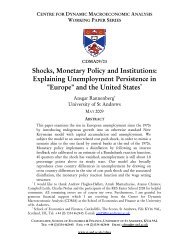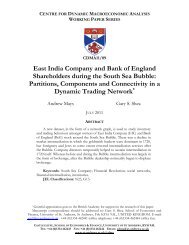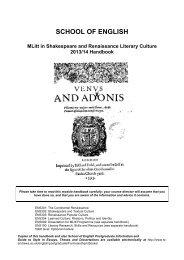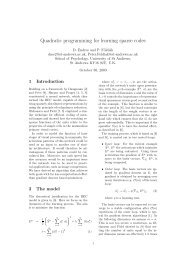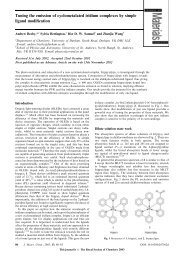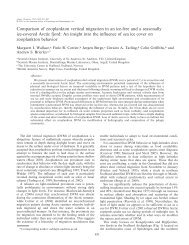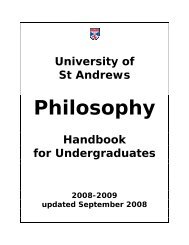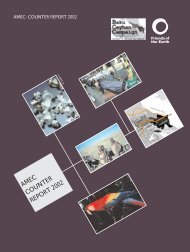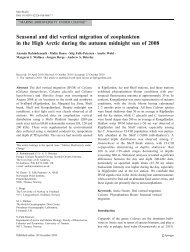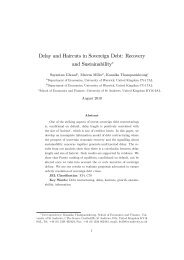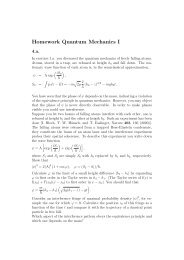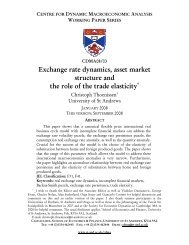introduction what is social anthropology? - University of St Andrews
introduction what is social anthropology? - University of St Andrews
introduction what is social anthropology? - University of St Andrews
Create successful ePaper yourself
Turn your PDF publications into a flip-book with our unique Google optimized e-Paper software.
SA1001<br />
ANTHROPOLOGY IN THE WORLD<br />
Th<strong>is</strong> module provides an <strong>introduction</strong> to some <strong>of</strong> the key <strong>is</strong>sues and debates in Social<br />
Anthropology. We begin by asking <strong>what</strong> <strong>is</strong> Social Anthropology, and in <strong>what</strong> ways it <strong>is</strong> different<br />
and similar from other ways <strong>of</strong> learning about the world. The guiding motive for the module <strong>is</strong><br />
that all <strong>social</strong> anthropolog<strong>is</strong>ts, no matter their approach or their subject <strong>of</strong> study, deal with one<br />
basic question, <strong>what</strong> does it mean to be human? In th<strong>is</strong> module we approach th<strong>is</strong> fundamental<br />
question by focusing on five sets <strong>of</strong> <strong>is</strong>sues and questions that have been central to the<br />
development <strong>of</strong> our d<strong>is</strong>cipline:<br />
• Introduction: the d<strong>is</strong>tinctiveness and scope <strong>of</strong> Social Anthropology.<br />
• Hunter‐gatherers and other so‐called ‘primitive’ peoples, usually represented in Euro‐<br />
American society as our living ancestors and as the remnants <strong>of</strong> an unchanging preindustrial<br />
world.<br />
• Movement in a global<strong>is</strong>ing world and the ways in which people such as Gypsies, tour<strong>is</strong>ts,<br />
migrants and exiles make sense their transient environments. Just <strong>what</strong> <strong>is</strong> ‘home’?<br />
• Issues <strong>of</strong> power and res<strong>is</strong>tance, and the ways in which peoples across the world have<br />
res<strong>is</strong>ted and continue to res<strong>is</strong>t their domination by others.<br />
• Tour<strong>is</strong>m as an industry and a component <strong>of</strong> global<strong>is</strong>ation and the cross‐cultural encounters<br />
it engenders.<br />
• Children and young people and their place in anthropological studies.<br />
___________________________________________________________________________<br />
Module Convener:<br />
Lecturers:<br />
Dr <strong>St</strong>an Frankland (mcf1). Please address all problems to him.<br />
Dr <strong>St</strong>an Frankland (mcf1), Dr Mattia Fumanti (mf610), Pr<strong>of</strong>essor Chr<strong>is</strong>tina<br />
Toren (ct51), Dr <strong>St</strong>avroula Pipyrou (sp78)<br />
Credits: 20<br />
Teaching:<br />
Lecture Hour:<br />
Tutorials:<br />
Ethnographic films:<br />
Weekly lecture series, ethnographic films, workshops and tutorials<br />
4pm Buchanan Lecture Theatre on Monday, Tuesday, Thursday and<br />
Friday<br />
These are held WEEKLY in either the department seminar room or in the<br />
Arts Building<br />
Films will be shown on Fridays at 4pm in the Buchanan Lecture Theatre<br />
Course Assessment: Two assessed essays = 60% Two hour examination = 40%<br />
A Reader Pack <strong>is</strong> available for th<strong>is</strong> module. It contains key readings for the course including all<br />
those necessary for the tutorials and a core <strong>of</strong> those required for the essays. The packs can be<br />
purchased through the Online Shop, https://onlineshop.standrews.ac.uk/ and collected from<br />
the Departmental Office. Other readings are available in Short Loan and, in some cases, via<br />
MMS.<br />
4



